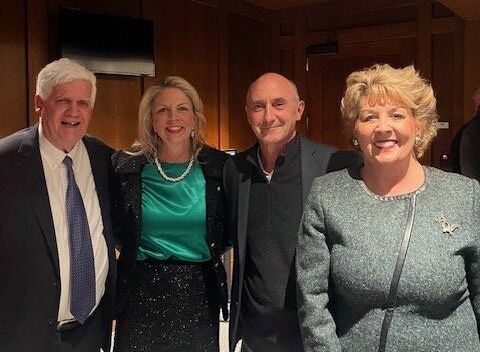Pete Hamill, who died last week, wrote “Why Sinatra Matters.”
Screen Time / By Peter McDermott
A key moment in the life of Frank Sinatra happened in 1947 when instead of going on a planned vacation around St. Valentine’s Day with his wife Nancy Sr., he decided to take a trip alone to sunny Cuba. There, he met Charles “Lucky” Luciano. This was the first time that his name was linked in the press with mobsters.
“Sinatra: All or Nothing at All” by Alex Gibney, one of the most prominent and prolific of U.S. documentarians, focuses on the resulting spat stateside with a journalist named Lee Mortimer, who sued and won a case in civil court against Sinatra for an assault in a restaurant.
But the camera catches a headline over a piece from the better-known Robert Ruark — syndicated columnist, novelist, drinker and big-game hunter. It read: “Sinatra is playing with the strangest people these days.”

Frank Sinatra, pictured in 1957, is the subject of “Sinatra: All or Nothing at All,” which is now streaming on Netflix.
The problem here — a big weakness — was that he loved the association with tough guys. And so, key turning points in his life got rewritten after the fact, particularly with the advent of Francis Ford Coppola’s two classic mafia movies in the first half of the 1970s. The horse’s head doesn’t get an explicit mention in the documentary, but the charge that the Mob revived Sinatra’s career by getting him a coveted part in “From Here to Eternity” in 1953 is analyzed and generally dismissed.
“It’s absurd,” Pete Hamill says. “‘The Godfather’ thing is a wonderful story, but it just doesn’t happen to be true as documentary.”

Frank Sinatra in the career-changing role of Maggio in “From Here to Eternity.”
We never see Hamill. His voice, though, forceful in his 60s and much softer by his 80s, is heard several times. Gibney, in this 2015 HBO mini-series that began streaming on Netflix two days before Hamill’s death last week, has few talking heads on screen, and instead skillfully knits together the oral and the visual from many archives.
Hamill, Terry Teachout and other writers keep the story sane, and voices from Sinatra’s music career like Mo Ostin and Nelson Riddle help make it fascinating throughout.
Hamill, the author of “Why Sinatra Matters,” says that after his second marriage to Ava Gardner collapsed his singing had a distinct “note of stoicism” in it. The great journalist summarized the attitude: “Alright. I lost you. I got knocked on my ass. I’m getting up now.”
Gardner was one of those who lobbied for her “son of a bitch husband” to get the role of Maggio in “From Here to Eternity” (1953), but the likely reason for his being tapped — and Hamill believed this — was because the dramatic actor the studio wanted, Eli Wallach, cost too much. The washed-up crooner would do it for less than half the price. He did and won an Oscar; and about the same time, his musical career was being revived at Capitol Records.
Likewise, perfectly reasonable non-Mob explanations are given for why a decade earlier Sinatra got himself out of a contract with Tommy Dorsey.
But the documentary veers off course when it suggests that just a few years after that mid-1950s rebound he’s so connected that he can make a phone call to fix a presidential election. There’s no attempt to debunk that Mob story.
Sinatra loved being around “legitimate power” and “illegitimate power,” but he got burned and humiliated when the two became too close. Gibney has an agenda here, which coincides with the perspective of the children— Nancy Jr. (a producer on the miniseries), the late Frank Jr. and Tina — and it’s that Sinatra is a victim of political hypocrisy. So he gets chased by the Kennedys into the arms of Nixon and Reagan. The view appears to be: what difference does it make — they all the same anyway, aren’t they? Mobsters, pols, businessmen, spies and assassins are interchangeable, apparently.
Lots of people, of course, traveled from FDR to Reagan, including the 40th president himself. Few, however, had the political background in the Democratic Party Sinatra had, and almost none took the strong public stand against bigotry and racism that he did. Indeed, he was so in favor of the Black man, the Feds assumed he was a Red.
Back in Hoboken, N.J., the Irish may have controlled politics but there was room in the Democratic Party machine for people like the tough and cold Dolly Sinatra and there was a longtime job, too, in the fire department for her shy husband Marty Sinatra, once known as boxer Marty O’Brien, the name used also for the couple’s tavern. Francis Albert Sinatra, the first in his family born outside of Italy (on Dec. 12, 1915), discovered earlier than most, and in the midst of the Great Depression, what he wanted to do in life. But when their only child dropped out of high school, Dolly and Marty weren’t at all pleased. Touring nationwide with a group called the Hoboken Four didn’t impress them; however, getting a gig with the Rustic Cabin roadhouse in Englewood Cliffs definitely did, because it was hooked up for live performances on WNEW radio station in New York City.
Around this time, a friend told Sinatra he would benefit from getting formal lessons and he eventually found a coach named John Quinlan, who had been drummed out of the Met for his drinking. The future star said he could soon see progress. “I worked for him a long time and then I began to get the jobs,” Sinatra remembered. The teacher and new superstar together issued a short book in the 1940s on singing techniques.
The documentary series (in two 2-hour parts) does a great job in telling this and the story of Sinatra’s relationships with his parents, his formidable first wife Nancy, who lived until 2018, his children, Ava Gardner, his third wife Mia Farrow and a whole range of colleagues.
And so if you’re interested in the story of the man Terry Teachout calls the “greatest pop singer of all time” and further if you agree with the late Pete Hamill that “Sinatra matters,” you’ll certainly find Gibney’s miniseries very watchable.








